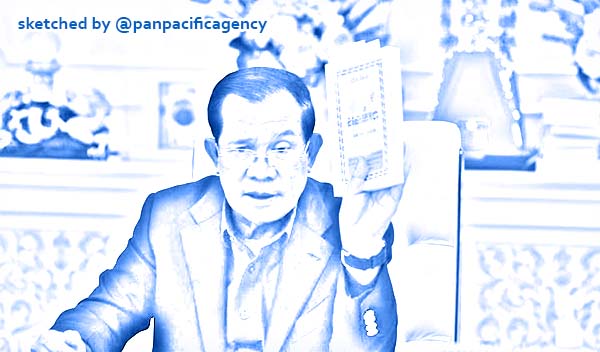[Analytics] Cambodia’s curbs on media, freedom of expression reach alarming levels

Cambodian Prime Minister Hun Sen continues to quarantine while waiting for the fourth and final test of COIVD-19. Supplied. Sketched by the Pan Pacific Agency.
Press freedom in Cambodia has steadily declined over the last few years, with local journalists and international media groups targeted or shut down over alleged attempts to criticize the ruling party’s policies and corruption in the government. In a statement on November 2, 57 civil society groups in the country issued a statement calling for the government to repeal or amend laws that repress the free press and to drop politically-motivated charges against journalists. Umair Jamal specially for the ASEAN Today.
Meanwhile, pro-government media outlets reportedly remain under extreme editorial pressure and must ensure everything is tacitly or explicitly approved.
The current government has clamped down hard on media groups for allegedly spreading false information, calling the media’s role in the country largely “unprofessional” and saying they need to be improved.
This doesn’t bode well for the country’s democratic forces as the next few months will result in further curbs on freedom of the press.
Understanding the declining freedom of Cambodia’s press
Press freedom in Cambodia has come under serious threat as journalists in the country have been killed, harassed and kidnapped for taking a critical stance against government policies.
In its 2020 report on media freedom worldwide, Reporters Without Borders (RSF) ranked Cambodia 144 out of 180 countries globally, citing the government’s increased “system for cracking down on dissent”. Reportedly, 42 newspapers and magazines in the country have been forced by Cambodia’s Ministry of Information to shut down since 1993.
Another recent independent report found that the closures of several media outlets in Cambodia were politically motivated. The report from the International Federation of Journalists, titled Cambodia’s Media on Edge, notes that Cambodia’s government has “politicized the country’s courts, restricted freedom of speech, assembly and association, and uses violence and imprisonment to suppress its political opposition, civil society and media.” The report cites a journalist as saying that “It’s very difficult for independent journalists to report on what we call ‘sensitive issues’ like politics, logging or corruption. We now worry if we are seen to be critical of the government or its minister that there will be serious repercussions. All [Cambodian] journalists are under threat.”
In many regards, the freedom of Cambodia’s press is on the verge of collapse and the situation is likely to deteriorate in the coming months.
What tools has the government used to curb press freedom?
The government has used a number of tools to silence critical voices in the media. From shutting down media outlets to delicensing and intimidating journalists, the current government has used constitutional loopholes to curtail independent journalism the country.
Cambodia’s constitution provides protection for freedom of the press. However, the ruling Cambodian People’s Party (CPP) and its allies exert outsized control over the current media landscape. As the ruling party pushed to consolidate power ahead of local elections in 2017 and national elections in 2018, there was a marked rise in cases of independent journalists and media outlets being accused of false reporting, delicensed or attacked.
The government in Cambodia has targeted journalists with defamation or disinformation lawsuits that can carry prison sentences and heavy fines. Radio Free Asia (RFA) closed its Phnom Penh bureau in September 2017, citing an “unprecedented level” of government interference. Reportedly, by the end of 2017, the Cambodian government had shut down more than two dozen local radio channels. The Cambodia Daily, an award-winning English-language newspaper known for independent and balanced reporting, was also forced to close, though it later reorganized and relaunched outside the country.
More recently, security agencies in Cambodia convicted Sovann Rithy, a prominent journalist and the director of the TVFB news website, of incitement and sentenced him to 18 months in prison for quoting comments by Prime Minister Hun Sen regarding COVID-19 in a Facebook post. As reported by the Cambodia Daily, Phnom Penh Municipal Police chief Sar Theth said that Rithy was arrested under Article 495 of the criminal code, a provision that penalizes “incitement to cause chaos and harm social security.” Cambodia’s Ministry of Information has also cancelled TVFB’s media license, alleging that the news site had “published information which contains incitement, affected social security, order and safety.”
Condemning the arrest, Daniel Bastard, head of RSF’s Asia-Pacific desk, said that “Imprisoning a journalist for quoting a statement by the prime minister word-for-word is more than absurd.”
The government justifies its actions by citing lack of professionalism
Cambodia’s government denies that any restrictions have been placed on press freedom. Instead, Cambodia’s Ministry of information has defended its policy of delicensing, saying its actions are justified by the spread of fake news and misinformation.
“[RSF] has never seen anything positive in press freedom or freedom of expression the government has provided so far in Cambodia,” Information Ministry spokesperson Ouk Kimseng told VOA in a statement.
“Those [reporters] did not follow the [professional] journalistic roles and responsibilities,” he adding, regarding the ministry’s de-licensing measures.
Other government officials also paint a similar picture. “Cambodia has taken a big step toward what we call a ‘free press regime’ in the context of an open and democratic nation, where we need journalists who have freedom,” said Phay Siphan, Cambodia’s top government spokesperson.
“Whatever you want to report, do it,” he added. “But it must be within a basis of truth, neither terrifying nor creating misunderstanding that leads to an uprising.”